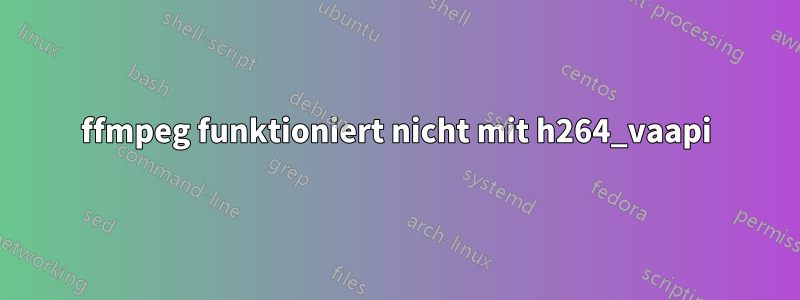
Ich versuche, ein Video mit ffmpeg und Hardwarebeschleunigung mit dem folgenden Befehl zu transkodieren:
sudo ffmpeg -hwaccel vaapi -hwaccel_output_format vaapi \
-vaapi_device /dev/dri/renderD128 -i in.mp4 -codec:v h264_vaapi out.mp4
es schlägt sofort mit dem Fehler fehl:
ffmpeg: i965_encoder.c:1692: intel_enc_hw_context_init: Assertion `encoder_context->mfc_context' failed.
Weitere Informationen:
Vollständige ffmpegAusgabe:
ffmpeg version 4.1.3-1 Copyright (c) 2000-2019 the FFmpeg developers
built with gcc 8 (Debian 8.3.0-7)
configuration: --prefix=/usr --extra-version=1 --toolchain=hardened --libdir=/usr/lib/x86_64-linux-gnu --incdir=/usr/include/x86_64-linux-gnu --arch=amd64 --enable-gpl --disable-stripping --enable-avresample --disable-filter=resample --enable-avisynth --enable-gnutls --enable-ladspa --enable-libaom --enable-libass --enable-libbluray --enable-libbs2b --enable-libcaca --enable-libcdio --enable-libcodec2 --enable-libflite --enable-libfontconfig --enable-libfreetype --enable-libfribidi --enable-libgme --enable-libgsm --enable-libjack --enable-libmp3lame --enable-libmysofa --enable-libopenjpeg --enable-libopenmpt --enable-libopus --enable-libpulse --enable-librsvg --enable-librubberband --enable-libshine --enable-libsnappy --enable-libsoxr --enable-libspeex --enable-libssh --enable-libtheora --enable-libtwolame --enable-libvidstab --enable-libvorbis --enable-libvpx --enable-libwavpack --enable-libwebp --enable-libx265 --enable-libxml2 --enable-libxvid --enable-libzmq --enable-libzvbi --enable-lv2 --enable-omx --enable-openal --enable-opengl --enable-sdl2 --enable-libdc1394 --enable-libdrm --enable-libiec61883 --enable-chromaprint --enable-frei0r --enable-libx264 --enable-shared
libavutil 56. 22.100 / 56. 22.100
libavcodec 58. 35.100 / 58. 35.100
libavformat 58. 20.100 / 58. 20.100
libavdevice 58. 5.100 / 58. 5.100
libavfilter 7. 40.101 / 7. 40.101
libavresample 4. 0. 0 / 4. 0. 0
libswscale 5. 3.100 / 5. 3.100
libswresample 3. 3.100 / 3. 3.100
libpostproc 55. 3.100 / 55. 3.100
Input #0, mov,mp4,m4a,3gp,3g2,mj2, from 'in.mp4':
Metadata:
major_brand : isom
minor_version : 512
compatible_brands: isomiso2avc1mp41
encoder : Lavf58.20.100
Duration: 00:38:59.14, start: 0.000000, bitrate: 9133 kb/s
Stream #0:0(und): Video: h264 (Main) (avc1 / 0x31637661), yuv420p(tv, bt709), 1920x1080 [SAR 1:1 DAR 16:9], 8999 kb/s, 25 fps, 25 tbr, 90k tbn, 50 tbc (default)
Metadata:
handler_name : VideoHandler
Stream #0:1(und): Audio: aac (LC) (mp4a / 0x6134706D), 48000 Hz, stereo, fltp, 128 kb/s (default)
Metadata:
handler_name : SoundHandler
File 'out.mp4' already exists. Overwrite ? [y/N] y
Stream mapping:
Stream #0:0 -> #0:0 (h264 (native) -> h264 (h264_vaapi))
Stream #0:1 -> #0:1 (aac (native) -> aac (native))
Press [q] to stop, [?] for help
ffmpeg: i965_encoder.c:1692: intel_enc_hw_context_init: Assertion `encoder_context->mfc_context' failed.
zsh: abort sudo ffmpeg -hwaccel vaapi -hwaccel_output_format vaapi -vaapi_device -i
vainfoAusgabe:
error: XDG_RUNTIME_DIR not set in the environment.
error: can't connect to X server!
libva info: VA-API version 1.5.0
libva info: va_getDriverName() returns 0
libva info: Trying to open /usr/lib/x86_64-linux-gnu/dri/i965_drv_video.so
libva info: Found init function __vaDriverInit_1_4
libva info: va_openDriver() returns 0
vainfo: VA-API version: 1.5 (libva 2.4.0)
vainfo: Driver version: Intel i965 driver for Intel(R) Coffee Lake - 2.3.0
vainfo: Supported profile and entrypoints
VAProfileMPEG2Simple : VAEntrypointVLD
VAProfileMPEG2Simple : VAEntrypointEncSlice
VAProfileMPEG2Main : VAEntrypointVLD
VAProfileMPEG2Main : VAEntrypointEncSlice
VAProfileH264ConstrainedBaseline: VAEntrypointVLD
VAProfileH264ConstrainedBaseline: VAEntrypointEncSlice
VAProfileH264ConstrainedBaseline: VAEntrypointEncSliceLP
VAProfileH264Main : VAEntrypointVLD
VAProfileH264Main : VAEntrypointEncSlice
VAProfileH264Main : VAEntrypointEncSliceLP
VAProfileH264High : VAEntrypointVLD
VAProfileH264High : VAEntrypointEncSlice
VAProfileH264High : VAEntrypointEncSliceLP
VAProfileH264MultiviewHigh : VAEntrypointVLD
VAProfileH264StereoHigh : VAEntrypointVLD
VAProfileVC1Simple : VAEntrypointVLD
VAProfileVC1Main : VAEntrypointVLD
VAProfileVC1Advanced : VAEntrypointVLD
VAProfileNone : VAEntrypointVideoProc
VAProfileJPEGBaseline : VAEntrypointVLD
VAProfileJPEGBaseline : VAEntrypointEncPicture
VAProfileVP8Version0_3 : VAEntrypointVLD
VAProfileHEVCMain : VAEntrypointVLD
VAProfileHEVCMain10 : VAEntrypointVLD
VAProfileVP9Profile0 : VAEntrypointVLD
VAProfileVP9Profile2 : VAEntrypointVLD
System Information:
OS: Debian GNU/Linux 10 (buster)
CPU: Intel(R) Pentium(R) Gold G5400
Driver: intel-media-va-driver-non-free/testing,unstable,now 19.2.0+ds1-1
(tried testing,stable and free/non-free)
Antwort1
Die Installation der nicht freien Treiber hat das Problem für mich gelöst:
apt install intel-media-va-driver-non-free i965-va-driver-shaders
Debian-Fehlerberichtsprotokolle – #910486 ffmpeg: VaAPI-Kodierung funktioniert nicht
Antwort2
Ich verwende
ffmpeg -hwaccel vaapi -i "infile" -vf scale=-2:size outfile.mp4 -vf scale=-2:1024,fps=fps=1/6 screenshots/%.jpg
und ich bekomme Fehler, weil ich eine NVIDIA-Grafikkarte verwende und diese mit einer Intel-Grafikkarte einwandfrei funktioniert. Ich vermute, das liegt daran, dass vom Treiber keine Screenshots erstellt werden können. Also führe ich zwei Durchgänge aus oder lasse es einfach über die Software laufen, denn wie viel mehr Kodierungs-/Dekodierungsleistung bekomme ich wirklich???
Ich möchte es auf diesem Intel Arc-Videosystem ausprobieren


